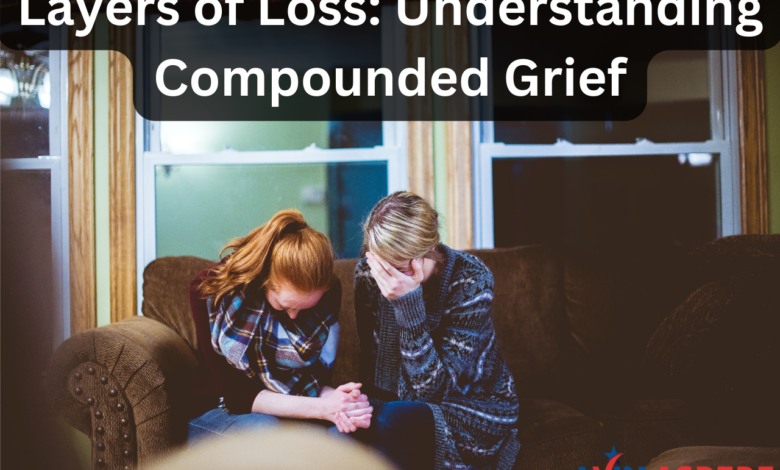Layers of Loss: Understanding Compounded Grief

Layers of Loss: Understanding Compounded Grief
Grief is a natural response to loss, but sometimes grief can become compounded, making it even more difficult to process and manage. Compounded grief, also known as complex grief, refers to the experience of having multiple losses occur close together or experiencing multiple losses over time without adequate time for healing in between. This can create a complex and layered experience of Layers of Loss: Understanding Compounded Grief that can be challenging to navigate.
Understanding Compounded Grief
Layers of Loss: Understanding Compounded Grief can occur in a variety of situations. For example, a person may experience the loss of a loved one followed shortly by the loss of a job, a divorce, or a serious illness. Or, a person may experience multiple losses over time, such as the death of several family members or friends in a short period.
What makes Layers of Loss: Understanding Compounded Grief different from “normal” grief is that the experience of loss is not isolated. Rather, it is interconnected with other losses, creating a complex web of emotions that can be difficult to unravel. This can lead to feelings of overwhelm, hopelessness, and despair.
Symptoms of Compounded Grief
The symptoms of compounded grief can be similar to those of “normal” grief, but they may be more intense and longer-lasting. Some common symptoms of compounded grief include:
- Persistent feelings of sadness and hopelessness
- Intense yearning for the person or thing that was lost
- Difficulty accepting the loss
- Feeling stuck or unable to move forward
- Difficulty with daily activities, such as sleeping or eating
- Isolation and withdrawal from friends and family
- Increased use of drugs or alcohol
- Suicidal thoughts or behaviors
These symptoms can be exacerbated by the fact that the grieving person may feel like they are “supposed” to be over their previous loss, making them feel guilty or ashamed for not being able to move on.
How to Manage Compounded Grief
Managing Layers of Loss: Understanding Compounded Grief can be a challenging process, but there are things you can do to help yourself move through it.
- Allow yourself to grieve: Recognize that the feelings you are experiencing are normal and give yourself permission to grieve. Don’t try to suppress or ignore your emotions, as this can prolong the grieving process.
- Seek support: Reach out to friends, family, or a mental health professional for support. Talking about your feelings can help you process them and feel less isolated.
- Practice self-care: Take care of your physical and emotional needs. Eat a healthy diet, get enough sleep, and exercise regularly. Engage in activities that bring you joy and help you relax.
- Be patient with yourself: Remember that healing takes time, and there is no “right” way to grieve. Be patient with yourself and don’t put pressure on yourself to “get over it.”
- Consider therapy: A mental health professional can help you work through the complex emotions of compounded grief. They can also help you develop coping strategies to manage your feelings.
Conclusion
Compounded grief is a complex and challenging experience that can be difficult to navigate. If you are struggling with compounded grief, it’s important to seek support and allow yourself to grieve. Remember that healing takes time, and there is no “right” way to grieve. With time, patience, and support, you can learn to manage your grief and find a way to move forward.
Frequently Asked Questions
- What is compounded grief?
Compounded grief, also known as complex grief, refers to the experience of having multiple losses occur close together or experiencing multiple losses over time without adequate time for healing in between. This can create a complex and layered experience of grief that can be challenging to navigate Layers of Loss: Understanding Compounded Grief.
2. What are the symptoms of compounded grief?
The symptoms of compounded grief can be similar to those of “normal” grief, but they may be more intense and longer-lasting. Some common symptoms of compounded grief include persistent feelings of sadness and hopelessness, intense yearning for the person or thing that was lost, difficulty accepting the loss, feeling stuck or unable to move forward, difficulty with daily activities, such as sleeping or eating, isolation and withdrawal from friends and family, increased use of drugs or alcohol, and suicidal thoughts or behaviors Layers of Loss: Understanding Compounded Grief.
3. How is compounded grief different from “normal” grief?
What makes compounded grief different from “normal” grief is that the experience of loss is not isolated. Rather, it is interconnected with other losses, creating a complex web of emotions that can be difficult to unravel. This can lead to feelings of overwhelm, hopelessness, and despair Layers of Loss: Understanding Compounded Grief.
4. How can I manage compounded grief?
Managing compounded grief can be a challenging process, but there are things you can do to help yourself move through it. These include allowing yourself to grieve, seeking support from friends, family, or a mental health professional, practicing self-care, being patient with yourself, and considering therapy Layers of Loss: Understanding Compounded Grief.
5. When should I seek professional help for compounded grief?
It’s important to seek professional help if you are struggling with compounded grief and are having difficulty managing your symptoms. A mental health professional can help you work through the complex emotions of compounded grief and develop coping strategies to manage your feelings. Additionally, if you are experiencing suicidal thoughts or behaviors, it’s important to seek immediate professional help Layers of Loss: Understanding Compounded Grief.












One Comment